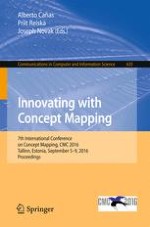2016 | OriginalPaper | Buchkapitel
The Educational Multimedia Clip as a Tool for Students’ Self-learning on Concept Mapping
verfasst von : Alla Anohina-Naumeca
Erschienen in: Innovating with Concept Mapping
Aktivieren Sie unsere intelligente Suche, um passende Fachinhalte oder Patente zu finden.
Wählen Sie Textabschnitte aus um mit Künstlicher Intelligenz passenden Patente zu finden. powered by
Markieren Sie Textabschnitte, um KI-gestützt weitere passende Inhalte zu finden. powered by
